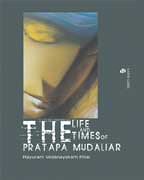The Financial Express
(New Delhi, Sunday, June 24, 2001)
“Coconut Palms, hot, sizzling dosas or political banter - he is at ease with all of these. Paul Zacharia, one of the best known Malayali writers of today, is known for his dedicated sense of writing. His political columns have often spruced up controversies.”
- Excerpts from Paul Zacharia's interview with Prachi Raturi
The Book Review
(6 June, 2001)
“I am not alone to experience this author-ruling-over-his-text phenomenon. Seemingly, Katha’s Geeta Dharmarajan also realizes it, at least that is what the beautiful cover of the book proves to be. Look at it. The title is written in tiny, almost invisible letters, while the author’s name appears prominently, in large, bright letters, underscoring the importance of the author in relation to his book.”
“But Praise the Lord is different. It is a work that the readers hold close to their heart. I for one have already read the original version two or three times, and yet I sat through the English version at a stretch, more often than not re-reading several passages. And to my surprise, I found that reading could still be a pleasure.”
“The book Praise the Lord and What News Pilate published by Katha holds testimony to this dual role Paul Zacharia plays with remarkable virtuosity. The two novellas do not in any way reflect any political or ideological issues that call for urgency. These are pure narratives tinged with pungent humour. The story seems to be simple, but what makes it fascinating is architecture, its characters and above all its language.”
“This book is undoubtedly the best example of Kerala’s overgrown contemporary fiction that we could show the world."
- M. Mukundan
The Financial Express
(New Delhi, Sunday April 22, 2001)
“Faithful Translation.”
“The first English translation of Kerala Sahitya Akademi Award winner, Paul Zacharia, is indeed refreshing. In the first of the two novellas in this edition, Zacharia captures, in simple sentences, the nuances of life in a rubber plantation in the humid climes of Kerala.”
The Indian Express
(New Delhi, Sunday, May 20, 2001)
“Paul Zacharia’s novellas, Praise the Lord and What News, Pilate?, illustrate in the Rushdiean age of clever writing how simple prose can be used to describe powerful emotions. Despite the brevity of the book (another blessing in this age of fast forward) the issues that it raises stay with you long after you have finished reading it.”
- Ashwin Ahmed
The Asian Age
(Sunday, 3 June 2001)
“The pungent humour, the sharp wit, the exacting eye for detail, athe absurd. All counched in the best of words.”
India Today
(May 7, 2001)
"The man doesn’t write novels, preferring to stick to the genre of the short story, or at times a novella, condensing his whimsical messages into a curtailed amount of prose. Usually his stories are decoctions of multiple tastes, often divergent with each other, variations of meaning and introspections. And the poniard of a subtle sensuality is always thrust into nodal points of the narration, proving Zacharia a maestro of super-suggestion. In many ways, it is also extraordinary hallmark."
- Ravi Shankar profiling Paul Zacharia
The Outlook Weekly News Magazine
(June 4, 2001)
“If Gabriel Garcia Marquez is the best writer in Malayalam, then Gita Krishnankutty’s translation proves that Malayalam reads much better when written in English. These stories explore the logic of deception, which animates the vocative.”
- Sanil V
The Telegraph, Calcutta
(Friday 4 May, 2001)
“Krishnankutty’s Translation is sensitive; she has retained several vernacular suffixes, but succeeded in keeping the text from becoming unwieldy or incomprehensible. Two novellas is certainly a stimulating read.”
- Cyril Arijit Ghosh
Frontline
(July 20, 2001)
“A decade later, however, the writers came to their own and the genre began to exhibit great variety in themes, styles and worldviews. One of the finest writers to emerge from the movement was Paul Zacharia - Known only as ‘Zacharia’ to Malyalam readers- seldom prolific, but ever careful and innovative. What makes Zacharia different is his vision that alternates between the tragic and the comic and his tenderness kept intact even in the most sarcastic of moods, without at the same time falling prey to sentimentality that is the bane of many compassion- driven writers.”
First City Magazine
(May 2001)
“Translated by Gita Krishnankutty, this wonderfully written book secretes a sort of superadhesive, gluing the book to your hands till you have read each and every word of it.”
“Though the book has a very basic plot, the way it has been written is enough to keep even the most meandering of minds enraptured.”
The Pioneer
(Saturday May 12, 2001)
“Praise the Lord is a rare work of art in terms of translation. Credit must go to Gita Krishnankutty for not letting linguistic limitations inhibit translation of even a typical Malayali slangl. Her rendition of Zacharia is almost perfect.”
“This is a work worth reading for two reasons. First, it is a fine work of literature by a master story-teller from God’s Own Country. Second, it is an even more superb work of translation of a remarkable portrayal of an ordinary life caught in even more ordinary events that, ironically, is what makes life what it is.”
The Author
Paul Zacharia
The Translator
Gita Krishnankutty
Publishers: Katha
Cover Design: Geeta Dharmarajan
Cover Painting: K S Kulkarni
ISBN 81-87649-10-0 [HB]
Price: Rs 120 [In the Indian subcontinent]
Labels: Adult Books, Gita Krishnankutty, Katha Malayalam Library, Paul Zacharia











